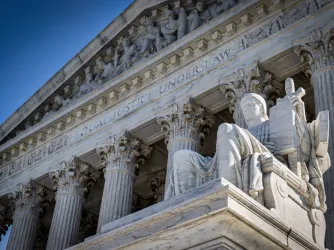Table of Contents
Federal Court Dismisses Counseling Student's First Amendment Suit
In a ruling (PDF) issued late last week, a federal district court dismissed graduate student Jennifer Keeton's First Amendment lawsuit against Georgia's Augusta State University's (ASU's) school counseling program.
Keeton had clashed with program faculty members over her religious views and their impact on her ability to conform to professional counseling standards. After a series of meetings with faculty over a proposed "remediation plan," Keeton told ASU faculty that her personal religious views would prevent her from abiding by professional counseling standards when interacting with certain clients, including those who chose to have abortions or were in LGBT relationships. Keeton's complaint challenged the program's requirement that she complete the remediation plan or else leave the program as a violation of her First Amendment rights to free speech and the free exercise of her religion. Additionally, Keeton challenged several sections of the program's policies, including portions that directly incorporated professional counseling standards issued by the American Counseling Association and the American School Counsellor Association.
In rejecting Keeton's claims, the court found that "the challenged policies target only professional conduct, not expressive activity as such," observing that "the policies are functionally akin to state professional regulations." (Emphasis in original.) Dismissing Keeton's argument that the imposition of the remediation plan was an attempt to "suppress Keeton's speech because of her personal religious viewpoint," the court wrote:
Within the course of this dialogue [with Keeton regarding the remediation plan], faculty members repeatedly invoked the professional ethical standards which govern counselor conduct, standards which "apply to all regardless of the particular viewpoint the counselor may possess," and communicated concern not that Keeton's values were derived from her adherence to Christianity, but instead that she would impose those personal values on clients to the clients' detriment. [Internal citation omitted.]
[...]
Put simply, faculty's concern was not the viewpoint from which Keeton's opinions issued, it was with the manner in which she insisted on wielding them.
In determining that the challenged policies are viewpoint neutral, the court quoted the Supreme Court's decision in Christian Legal Society v. Martinez, finding:
Moreover, the fact that Keeton faced burdens not faced by "other students who d[id] not intend to express their personal religious beliefs to clients" is of no moment. Id. at 874. After all, "[a] regulation that serves purposes unrelated to the content of expression is deemed neutral, even if it has an incidental effect on some speakers or messages but not others." CLS, 130 S. Ct. at 2994 (quoting Ward v. Rock Against Racism, 491 U.S. 781, 791 (1989).
Worryingly, the court's finding that the challenged policies are reasonable relies on the Supreme Court's decision in Hazelwood School District v. Kuhlmeier, 484 U.S. 260 (1988). As we've discussed here on The Torch before, courts relying on Hazelwood in adjudicating cases involving college students is troubling, as Hazelwood is a high school case that grants schools broad power to regulate "student speech in school-sponsored expressive activities so long as their actions are reasonably related to legitimate pedagogical concerns." In finding ASU's policies reasonable, the district court here invoked Hazelwood and two other K–12 cases to determine that ASU "has a legitimate pedagogical concern in teaching its students to comply with the ACA Code of Ethics" and the other challenged policies. Importing this low standard of review into the collegiate setting gives universities expansive authority to punish student speech, as I outline at length here in discussing Ward v. Polite, a recent ruling on similar facts from the United States Court of Appeals for the Sixth Circuit.
The court's dismissal comes two years into the litigation. Keeton filed her complaint against ASU in July 2010 with the assistance of the Alliance Defense Fund. In August of that year, the federal district court denied Keeton's motion for a preliminary injunction to block Augusta State's imposition of its remedial plan on Keeton, a decision that was upheld in December 2011 by the United States Court of Appeals for the Eleventh Circuit. FIRE had signed an amici curiae brief filed with the Eleventh Circuit arguing for the opposite result. The brief, authored by noted First Amendment expert and University of California, Los Angeles law professor Eugene Volokh and joined by the National Association of Scholars, argued that imposing unique requirements on certain students because of their expressed viewpoints violates the First Amendment.
Between this ruling, the Sixth Circuit's February 2012 ruling in Ward, and the Minnesota Supreme Court's decision last week in Tatro v. University of Minnesota, campus speech advocates have seen significant legal developments in recent weeks and months regarding the intersection of student speech rights and professional standards imposed on students participating in certain professional programs. We'll have more analysis of the court's decision in the coming days. In the meantime, the Student Press Law Center has more.
Recent Articles
Get the latest free speech news and analysis from FIRE.

The federal charges against Don Lemon raise serious concerns for press freedom

The American people fact-checked their government

California prohibits its teachers from talking about a student's gender identity to their parents. That raises First Amendment concerns.
